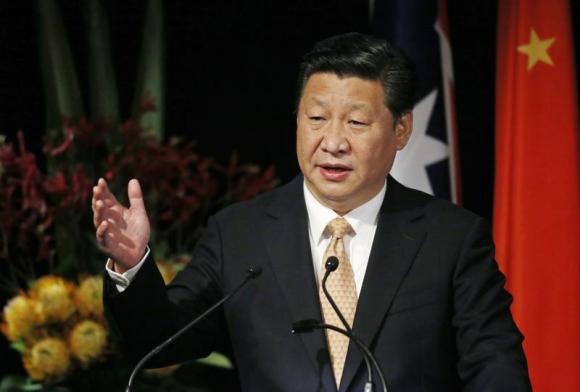Following recent reports that authorities have urged Chinese media to steer away from referring to the president as “Daddy Xi” (Xi Dàda 习大大)—an endearing nickname that for years has been a lynchpin of Xi Jinping’s official image-crafting campaign—a new musical tribute was promoted this week by an official provincial WeChat account. The South China Morning Post’s Catherine Wong reports on the song, its composer, and how the propagation of it violates reported central directives:
The song, with a title roughly translated as “Xi Dada comes to our home”, was posted on Monday on the official WeChat account of the cyberspace watchdog in Anhui province.
It recalls Xi’s visit to Anhui last month, when he discussed reforms and poverty-relief policies with officials and villagers, and called on officials to listen to intellectuals.
[…] The song was sung by a relatively unknown singer from Anhui, Li Hongyu, who also wrote the lyrics.
Li reportedly said he was inspired to write the song after hearing Xi was visiting his hometown.
[…] The song is the latest in a growing list of musical tributes to Xi since he took power more than three years ago [see prior CDT coverage]. [Source]
Bloomberg last week reported that employees of both state and private media outlets, as well as those in charge of official government bodies, were warned to stop using the moniker:
In recent weeks, news outlets including the official Xinhua News Agency and the 21st Century Business Herald have been cautioned against using “Xi Dada” in reports and on social media, according to people with knowledge of the matter.
Xinhua employees were told last Friday not to refer to Xi as “Dada,” said one of the people, who asked not to be identified discussing internal policies. The Central Political and Legal Affairs Commission received a similar order for its publications, according to another person.
[…] Edicts banning the use of the name by state-controlled media show authorities feel they need to tone down the rhetoric, said Zhang Lifan, a Beijing-based historian and political commentator.
“The deification effort has hit a snag,” Zhang said. “The approach was a bit too crude and went overboard, and it met with resistance and even sparked repulsion. The propaganda team needs something different to accentuate Xi’s authority.” [Source]
Deriving from the Shaanxi dialect, the term has been in use since the early days of Xi’s presidency. In September of 2014, it saw a surge in usage after Xi personally approved it while visiting Beijing Normal University. After the visit, some netizens commented that using the term denoted servility, giving rise to the sarcastic netizen phrase “have everything but daddy,” a play on the traditional Chinese concept of the five elements, mocking those who slavishly adore the president.
At The Guardian, Tom Phillips reports further on propaganda officials’ efforts to eradicate the nickname following a rush of Western reports comparing Xi’s heavily cultivated image to the cult of personality that surrounded Mao Zedong:
The moniker has not appeared on Xinhua’s website since 27 April but did show up in a 1 May story on another party-run news website with the headline: “What Big Daddy Xi said at the Communist party’s Central Party School conference.”
It is unclear why Beijing’s propaganda officials have decided to step back from Xi’s nickname. Experts believe it may hint at growing discomfort – both in and outside China – about how the leader is portrayed as a Mao-style autocrat.
In recent weeks, Chinese officials have expressed discomfort over the perception that a cult of personality is growing around their leader. The website of the Economist was blocked in China after a cartoon on its front page showed Xi sporting a Mao-style Zhongshan suit beside the headline: “Beware the cult of Xi”.
[…] Roderick MacFarquhar, a Harvard University China expert, said the apparent abandonment of the nickname was unlikely to signal a change in direction for the authoritarian leader, who has suggested is the country’s most powerful since Mao.
“My own feeling is that he may be tweaking the way he presents himself but I don’t think that he is changing his fundamental principles. [His belief remains] that if there is going to be a ‘Chinese dream’ it has got to be Xi Jinping who is in charge,” MacFarquhar said. […] [Source]







